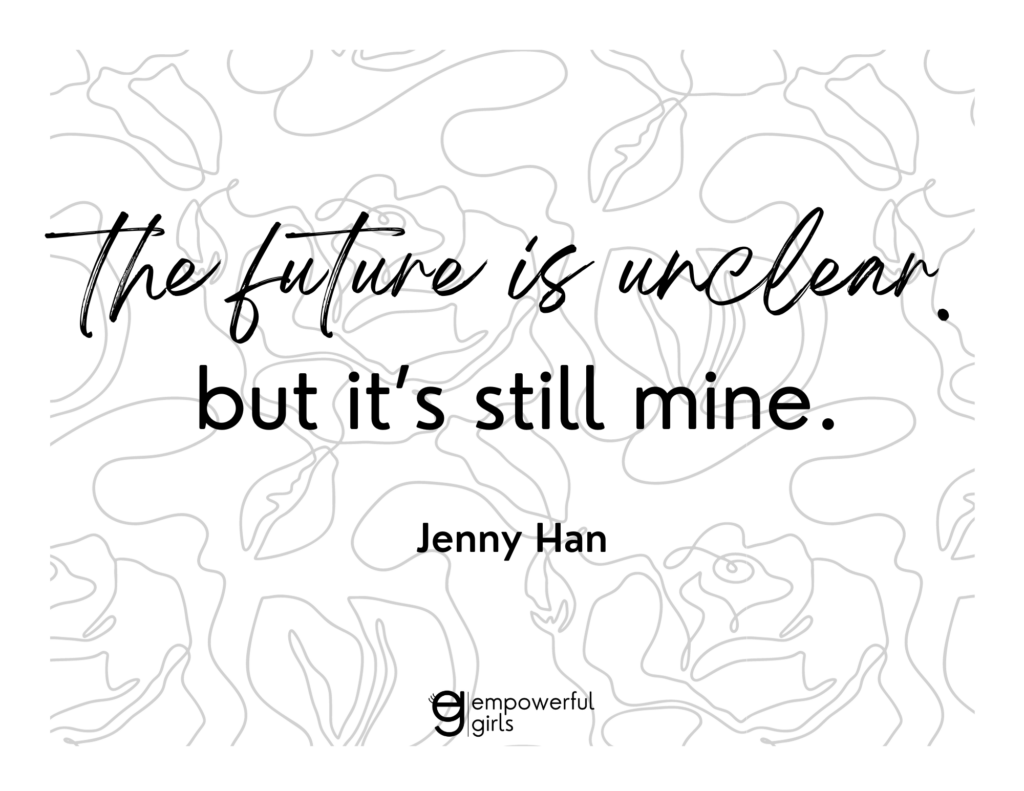
Feelings for the Year Ahead
Happy New Year! I hope 2024 is already off to a great start for you. Last episode we looked back and reflected. Since then I’ve been thinking a lot about the year ahead. I’ve got some plans already in the works and a bunch of other big ideas, too. Has the new year got you thinking about events coming up or things you hope will happen? Perhaps you’re looking forward to it. Or maybe you feel uncertain about something, or worried, even anxious. I feel that way too sometimes. Maybe you’re anticipating a big change ahead, or you’re starting to feel awkward around people or about yourself, or you’re nervous about an upcoming competition or tryout, or you’re dreading a huge exam or deadline happening soon.
Stress vs. Stressors
Those things are all stressors, which are different from stress. Stress is how your body and hormones respond to a real or perceived threat–the stressor. So stressors are the source of your stress, or what triggers you to feel it. People respond differently to the same stressor–like if I was set to speak at an upcoming event, that wouldn’t really stress me out, but it would for other people. And those same people may want to go skydiving but that terrifies me. It’s okay to have different stress responses than others do over the same stressor.
How Stress Shows
Thinking about what this year has in store may stress you out. You might feel uneasy, overwhelmed, pessimistic, or fearful. You may even catastrophize, which is seeing a situation in worst case scenarios or assuming the outcome will only be a catastrophe. Along with these internal anxious thoughts and feelings, there are other noticeable stress responses. Some ways we show stress is we’re more easily irritated by things, our reactions are bigger than usual, or we have a shorter fuse and lash out. Other times we respond to stress by withdrawing, we feel drained and unmotivated. Sometimes stress makes us not function as well, we get headaches or stomach aches, forget things, or eat and sleep poorly. Facing the future doesn’t have to leave you stressed out, though. Let’s talk about effective ways you can mindfully respond to stress in the moment.
Worry Won’t Change It
I’ve mentioned this before, it’s something I learned in therapy and have to continually remind myself: Worrying about something will not change it. Just racking your brain with worry will not fix or prevent things, it will only feed your fears and get you even more upset. And the bigger your worry grows, the harder it becomes to handle it and shrink it. Say you and your friend got in a fight over the weekend; worrying about seeing them in class next week isn’t going to repair your relationship or prevent you from seeing them. Or if you have a playoff game or competition against a top team, fearing they will beat your team doesn’t make them any less talented or help you perform any better. Agonizing over an essay isn’t going to change the due date or get it written. Worry alone will not alter any outcomes; worry does not have the same effect as action, as doing something about it. I’m not saying this to discourage you, it’s to give you perspective so you don’t get stuck in stress. So I’m gonna say it again: Worrying about something will not change it.
Best, Base Case Scenarios
Next, if you’re gonna catastrophize about something coming up and imagine worst case scenarios, you need to give yourself more options for possible outcomes. Use your imagination and balance things out with some best case scenarios. Worst case scenarios for the fight with your friend: bad–your friend ignores you in class; worse–they tell you off in front of the whole class; worst–they turn all your friends against you. Sure, those things could happen, but things could go differently. Best case scenarios: good–your friend smiles at you in class; better–you and your friend fix things together in class; best–you and your friends get along perfectly from that day on. Those things could happen, too. I also think it’s important to consider scenarios that fall in between worst and best, these are called base case scenarios. They’re mid. In this situation, a base case scenario would be your friend ignores you in class and you have some space and time for things to settle. It’s not the best, it’s not the worst, it’s in between. So again, when you find yourself catastrophizing worst case scenarios, counter with some best case scenarios and base case scenarios. You can’t predict what’s actually going to happen, but considering multiple possibilities can help shrink your worry to a more manageable size. Then you’ll be in a better headspace to consider if there’s anything you can do about your worry so you don’t feel so stressed.
What You Can Control
The future has a lot of unknowns, multiple variables, and things that are simply out of our control. And if we only focus on those things we can’t control, we’ll just stay stuck worrying and stressing over them. You may not have the ability to change a situation. Acknowledging what you can’t control will help you accept that truth, and will allow you to explore what IS within your control. Things you CAN do about it. Remember, worry alone won’t change things, but doing something could. The saying goes, “You can’t change the winds, but you can adjust your sails.” You can’t control how your fight friend acts around you, but you can control how you treat her. You can’t control the other team’s players, but you can stay focused on your own performance. You can’t stop your body from growing up, but you can practice self compassion. You can’t guarantee you’ll be accepted into a program, but you can prepare and give your best when you apply. You can’t keep your brother from graduating and moving out, but you can spend meaningful time together until he leaves and plan to have a weekly video call to catch up. Accepting what you can’t control and focusing on what you CAN will help you feel less stressed about your life and more in-control of your life.
You’re Gonna Be Ok
Finally, whatever you’re facing in the future, please trust that you’re gonna be ok. You have a host of past experiences to prove it. You’ve faced change, uncertainty, and difficult odds before. And you are still here. Things worked out, maybe not how you’d hoped, but in the end things were all right. You got through things in the past, you’re gonna be ok in the future. Trust that.
As much as we wish we could eliminate future stress and stressors, they’re a part of our life. Worrying alone won’t change things. Focusing on worst case scenarios and things we can’t control will only discourage us. But including best case and base case scenarios will help us recalibrate so we can consider things we CAN control and do something about them. Then facing the future will be something we can look forward to.
To quote author Jenny Han, “The future is unclear; but it’s still mine.”
Future Poster Printable
I created a poster of this quote for you to print out, personalize, and post on your wall where you’ll see it, remember it, practice it, and believe it — that’s the important part.
Resources
We’ve discussed stress management before, if you haven’t heard them already or need a refresher, check out these related episodes: 02 What You Can Control, 05 Just Breathe, 015 Manage Stress, 020 Cope with Change, 030 Self Care for Stress, and 060 Rest.
Also if you want to set some goals, intentions, or focus for this year, check out episode 06 Go Get Your Goals Girl, 24 Take these into 2022 (it’s still applicable in 2024), and 56 Word (of the Year).
If you have a topic suggestion, I’d love to hear from you! Send an email (tweens get the OK from your parents) to hello@EmpowerfulGirls.com .
If you have social media already, follow me on Insta or tiktok @empowerfulgirls. I’m not encouraging or endorsing social media, but I’m on there to offer an unfiltered, uplifting alternative to what’s in your feed. Remember to get on the email list for the newsletter!
